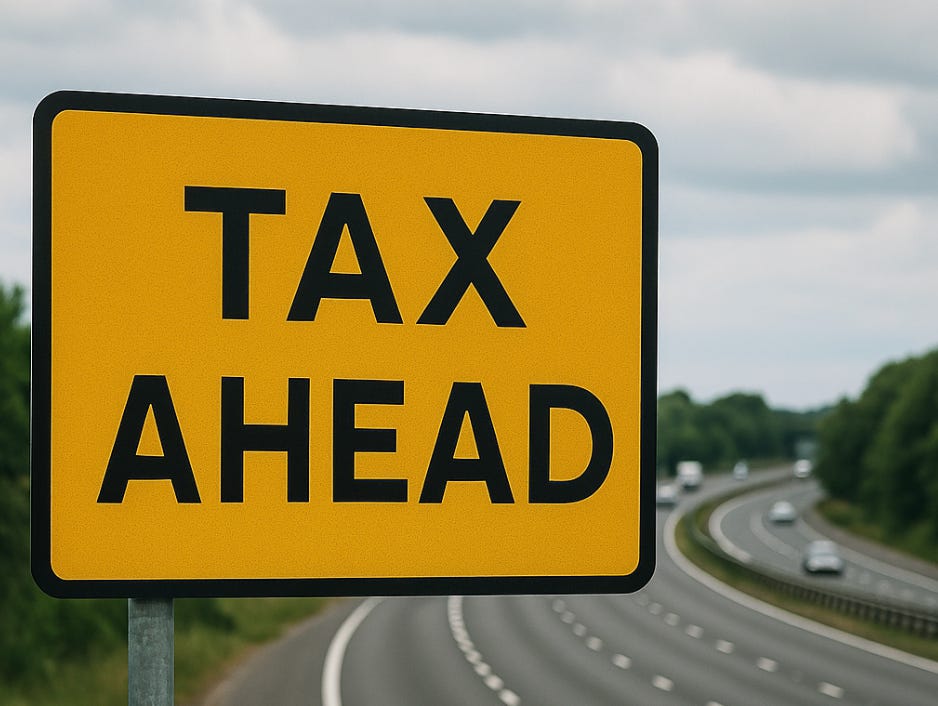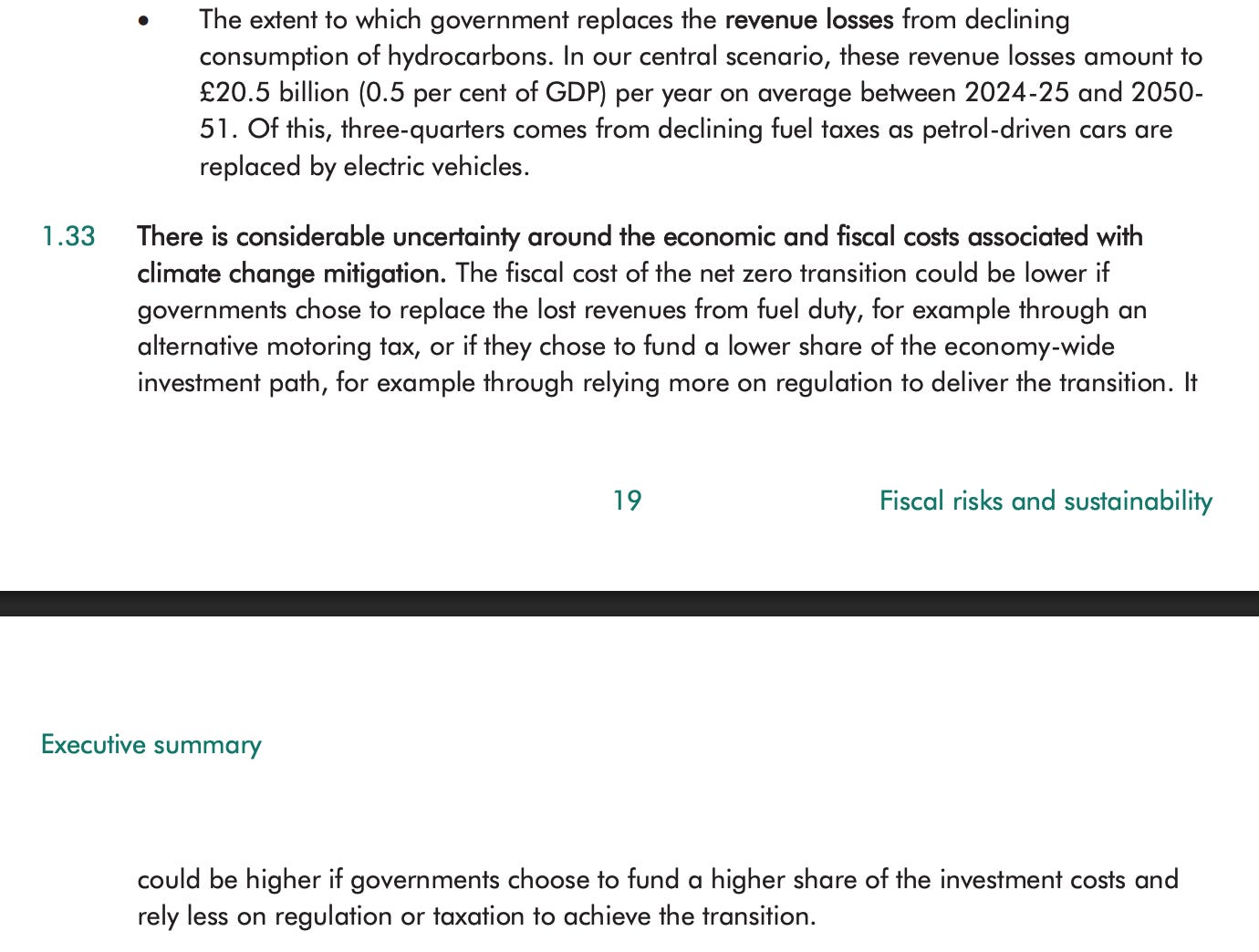Pay-per-mile: Three reasons why the time is right
Everything to know about the Chancellor’s new EV tax
Hello, I’m Tom Riley, and welcome back to The Fast Charge, a British EV newsletter.
Top story in today’s edition... Everything we know about the mooted pay-per-mile tax and three reasons why I believe the time is right to discuss it.
In other news... Gen Z believes EVs are sexy, lots of hub openings, and Zapmap reveals its latest satisfaction results.
As ever, if you have any comments or feedback, please reply to this email or message me on LinkedIn.
🙏 Remembering a legend...
It would be amiss for me not to begin today’s edition without mentioning the death of a motoring and EV legend: Quentin Willson.
It’s a true testament to his impact on this industry that my LinkedIn feed has been wall-to-wall tributes since he passed on Saturday. I shared my own tribute to Quentin on Sunday, highlighting a quote from my interview with him about his FairCharge campaign.
In short, I’d asked Quentin, given everything he’d achieved over his career, why he hadn’t decided to hang up his coat. Quentin responded:
“People like me, in the public eye, have a degree of influence and have a platform. We’re almost morally beholden to do this. I mean, yes, you can relax and vanish into affluence, but it’s about putting something back and doing something important.”
Extract taken from my interview with Quentin in 2022 – You can read it here.
For me, that quote sums up Quentin perfectly. A grounded person with buckets of generosity. He was the ultimate driver’s champion, and we couldn’t have lost his voice at a more critical time. It would be an ultimate legacy for his campaigning efforts if, at the upcoming Budget, VAT is equalised for all drivers – whether they have a driveway or not.
On a final and personal note, after my own diagnosis of cancer last year, Quentin was quick to offer his advice and encouragement. And when I eventually got back on my feet, he became my first paying subscriber. I feel privileged to have known him, and my condolences to Quentin’s family.
Pay-per-mile tax: Three reasons why the time is right
Summary: Last week, a report published by the Daily Telegraph suggested that the Chancellor is going to introduce a new pay-per-mile tax for EVs from 2028 in the upcoming Budget. The details are thin, though the Telegraph reports that EV drivers could be charged 3p per mile. That means for the average UK driver, who does about 7,000 miles per year, in an EV, you’ll have to stump up £210 annually.
How will it work? According to reports, it’s suggested that drivers will need to estimate their mileage for the year ahead and pay in advance as well. Any miles they don’t use will carry forward. My guess is it’ll be either a self-reporting tool on GOV.UK, or will form part of an annual MOT check, to catch out any fraud. In any case, there is apparently going to be a consultation published on its design and implementation.
Is this really true? Yes, I appreciate we can’t always trust what the Telegraph says about EVs. However, the fact that the story came from their Political Editor, so is in the ‘media lobby’ which gets significant access to ministers, Spads and spokespeople, is a sign it’s serious. Likewise, in response, the Government hasn’t exactly shut it down. In fact, they’ve done the opposite.
In a comment to the BBC, a government spokesperson said: “We want a fairer system for all drivers whilst backing the transition to electric vehicles... It is right to seek a tax system that fairly funds roads, infrastructure and public services... We will look at further support measures to make owning electric vehicles more convenient and more affordable.”
The industry backlash has been immense. From SMMT to ChargeUK to EVA England and all those in between, I have struggled to find anyone who believes that such a policy is sensible. That is, apart from me.
‘Tom applies a combat helmet’... I admit, the timing of this policy, arriving just after the UK government has spent so many months trying to turn around the adoption and sentiment of EVs, does look rather misaligned. Perverse, even.
However... I ask you to seriously consider this question: if now is the wrong time, when will it be the right one?
Below, I’ve outlined the economic, political, and environmental arguments as to why I think it’s the right time to be having this conversation.
1. The economic argument: Treasury has to prove it’s serious
For numerous years now, the Office of Budget Responsibility (OBR) has been pointing out how falling fuel duty receipts are creating a gap in the UK’s Budget. And, as much as everyone argues the freeze should end instead, that is only a short-term fix. What the Treasury boffins need to do is show the economists, whose views ultimately drive inflation, interest rates, and the health of UK Plc, that there is a viable way of paving this growing pothole.
In a bleak July update which looked at current pressures on public finances, the OBR wrote “the fiscal cost of the net zero transition could be lower if governments chose to replace the lost revenues from fuel duty, for example through an alternative motoring tax”. I’m therefore not surprised this policy has come forward now. The Chancellor is in a position where the lenders are at her door, going ‘right, what is your plan to get out of this pickle?’ This policy proposal is, effectively, the Treasury showing them it’s being taken seriously.
2. The political argument: Labour cannot afford to wait
EVs are not new anymore; many early adopters are already onto their second or third EVs now. And that uptake graph to 2030 is only going to accelerate.
By 2028, there will be millions of EV drivers, and more than 50% of new sales are expected to be electric. If Labour doesn’t air this policy soon, it’s only going to get harder to introduce as more of the population switches. They certainly won’t want to put it off until an election year in 2029.




